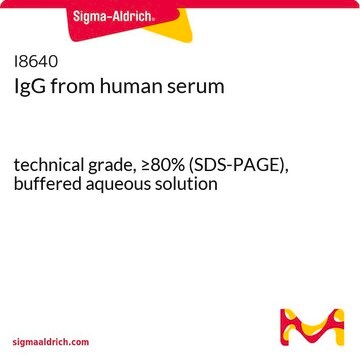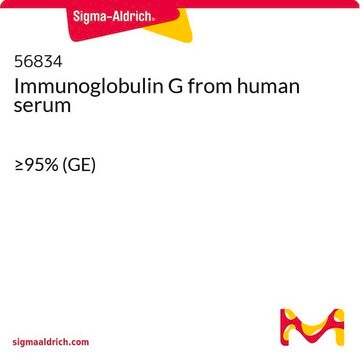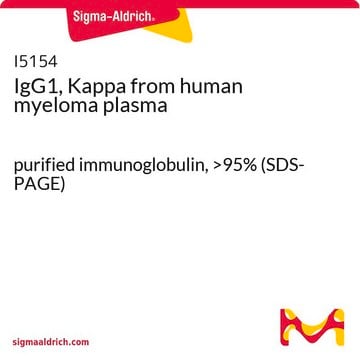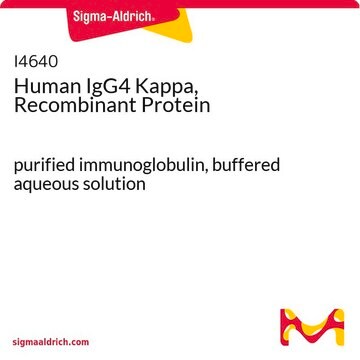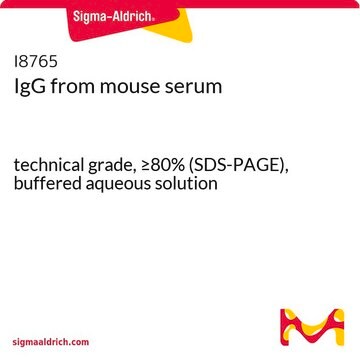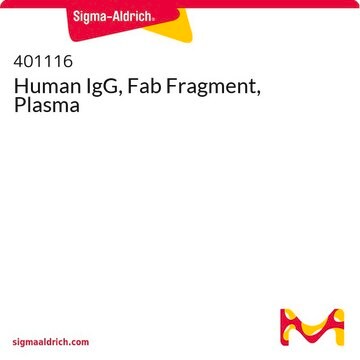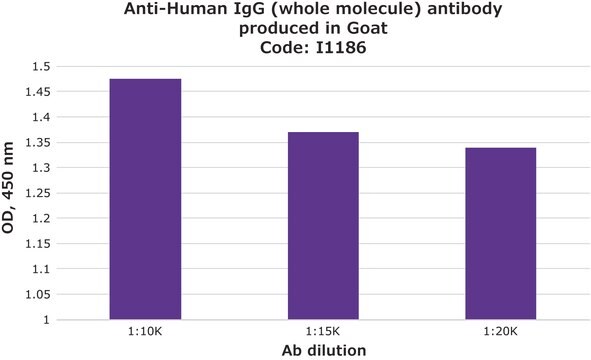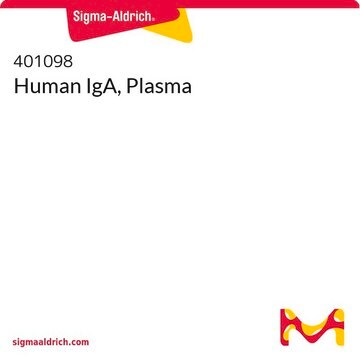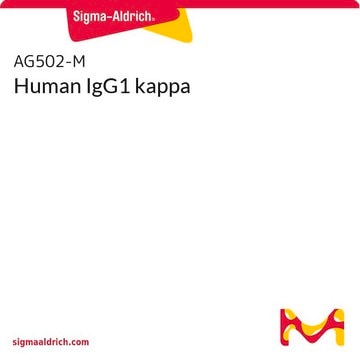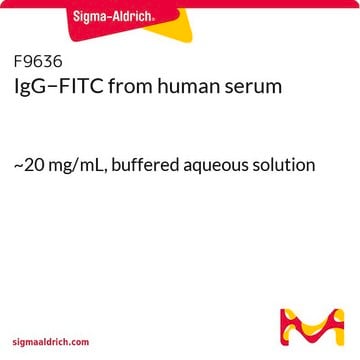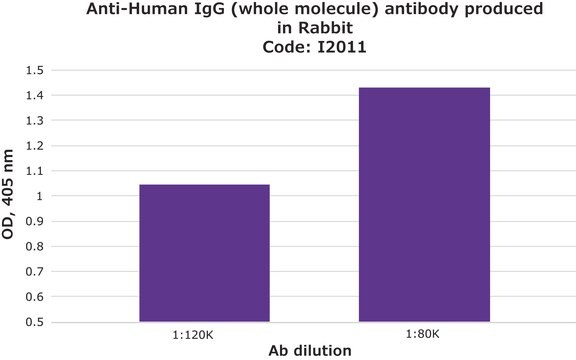I2511
IgG from human serum
reagent grade, ≥95% (HPLC), buffered aqueous solution
Synonym(s):
Human IgG
Sign Into View Organizational & Contract Pricing
All Photos(1)
About This Item
Recommended Products
conjugate
unconjugated
grade
reagent grade
Assay
≥95% (HPLC)
form
buffered aqueous solution
shipped in
dry ice
storage temp.
−20°C
target post-translational modification
unmodified
Looking for similar products? Visit Product Comparison Guide
General description
IgG antibody subtype is the most abundant serum immunoglobulins of the immune system. It is secreted by B cells and is found in blood and extracellular fluids and provides protection from infections caused by bacteria, fungi and viruses. Maternal IgG is transferred to fetus through the placenta that is vital for immune defence of the neonate against infections
Human IgG is purified from normal human serum by precipitation and gel filtration techniques.
Human IgG is purified from normal human serum by precipitation and gel filtration techniques.
Application
Purified human IgG has been used :-
- as blocking antibody for flow cytometry
- as negative control in chromatin immunoprecipitation assays
- to precipitate IgG in human larynx epidermoid carcinoma cells by immunoprecipitation
- as a standard in enzyme-linked immunosorbent assay
Biochem/physiol Actions
Immunoglobulin G (IgG) regulates the immune responses such as phagocytosis and is also involved in the development of autoimmune diseases. IgG1 regulates complement fixation in mice.
Physical form
Solution in 0.01 M phosphate buffered saline, pH 7.4, containing 15 mM sodium azide
Disclaimer
Unless otherwise stated in our catalog or other company documentation accompanying the product(s), our products are intended for research use only and are not to be used for any other purpose, which includes but is not limited to, unauthorized commercial uses, in vitro diagnostic uses, ex vivo or in vivo therapeutic uses or any type of consumption or application to humans or animals.
Storage Class Code
12 - Non Combustible Liquids
WGK
WGK 1
Flash Point(F)
Not applicable
Flash Point(C)
Not applicable
Certificates of Analysis (COA)
Search for Certificates of Analysis (COA) by entering the products Lot/Batch Number. Lot and Batch Numbers can be found on a product’s label following the words ‘Lot’ or ‘Batch’.
Already Own This Product?
Find documentation for the products that you have recently purchased in the Document Library.
Customers Also Viewed
In-Kyu Yoon et al.
The American journal of tropical medicine and hygiene, 72(6), 714-718 (2005-06-21)
Volunteers vaccinated with a candidate malaria vaccine containing merozoite surface protein 1(42) (MSP-1(42)) exhibit antibodies to MSP-1(42) that are measured by enzyme-linked immunosorbent assay (ELISA). The purpose of this study was to make a human reference standard for MSP-1(42) antibody
Kah Teong Soh et al.
Current protocols in cytometry, 75, 7-7 (2016-01-09)
Nucleic acid content can be quantified by flow cytometry through the use of intercalating compounds; however, measuring the presence of specific sequences has hitherto been difficult to achieve by this methodology. The primary obstacle to detecting discrete nucleic acid sequences
Kentaro Matsuda et al.
The Journal of allergy and clinical immunology, 116(6), 1357-1363 (2005-12-13)
Mouse monoclonal IgE antibodies can promote the survival of mouse bone marrow-derived cultured mast cells and induce the cells to secrete mediators in the absence of known specific antigen. To determine whether human IgE, in the absence of known specific
Rebeca M Torrente-Rodríguez et al.
PloS one, 12(4), e0175056-e0175056 (2017-04-05)
The first electrochemical immunosensor for the determination of fibroblast growth factor receptor 4 (FGFR4) biomarker is reported in this work. The biosensor involves a sandwich configuration with covalent immobilization of a specific capture antibody onto activated carboxylic-modified magnetic microcarriers (HOOC-MBs)
Astgik Petrosyan et al.
Nature communications, 10(1), 3656-3656 (2019-08-15)
In this work we model the glomerular filtration barrier, the structure responsible for filtering the blood and preventing the loss of proteins, using human podocytes and glomerular endothelial cells seeded into microfluidic chips. In long-term cultures, cells maintain their morphology
Our team of scientists has experience in all areas of research including Life Science, Material Science, Chemical Synthesis, Chromatography, Analytical and many others.
Contact Technical Service
